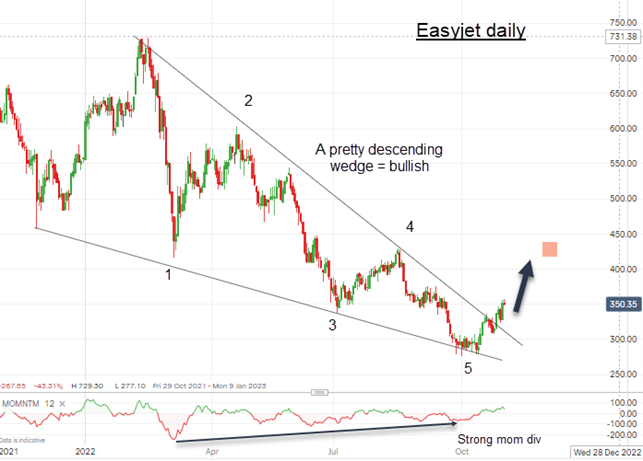Chart of the week: time to buy as bullish breakout confirmed?
14th November 2022 11:37
by John Burford from interactive investor
This stock was sold mercilessly after the pandemic, then again as recession fears grew. But after a key technical move, analyst John Burford finds reason to be optimistic.

easyJet is on the runway
From the depths of the pandemic-mandated near-destruction of the airline industry, is it possible easyJet (LSE:EZJ) has not only survived but is on the verge of a Phoenix-like re-birth into a new era of travel?
On the surface, the omens are not propitious, with widespread forecasts of recession ahead – and of course the negative economic impact of this week's budget that is certain to weaken discretionary spending by UK consumers.
- Find out about: Trading Account | Share prices today | Top UK shares
But demand for foreign holidays remains strong – and such breaks have almost become mandatory in the British psyche, especially when viewed from the dark days of our gloomy winters.
Given this unpromising backdrop, do the charts support a contrarian bullish outlook?
This is the chart I posted on 1 November that pointed to a potential huge upside breakout directly ahead. Remember, the shares had fallen hard from the February high of 1,560p to the recent low at 280p for a savage decline of 82%. Ouch!

Past performance is not a guide to future performance.
This wedge pattern is of classic form, with five clear sub-waves and the added bonus of a strong momentum divergence at the October fifth wave low. Very promising.
My first target was set at the previous wave 4 high around 430p. And on Friday, the market surged into that zone to help confirm the bullish breakout.
In classic technical analysis, when a five-wave down-sloping wedge terminates a long and strong downtrend, the market usually moves back to the start of the pattern. In this case, that is at the 730p region. Hmm.
- Insider: post-results slump is buy signal for this chief
- Must read: global markets, China, UK house prices, Joules, Informa
In common with other major airlines, easyJet had taken on huge debts which have been looking more and more onerous as bond yields have spiked up recently. Of course, that preyed on the mind of investors earlier this year to induce heavy selling of the shares.
But with air fares moving much higher than they were pre-pandemic, cash flow is recovering sharply and that will allay some fears about the debt burden.
And now with the travel business improving post-pandemic, easyJet has become a possible takeover target for larger operations such as International Consolidated Airlines (owner of British Airways).
I see further upside but an unlikely move below the £3.40 level would make me dust off my drawing board.
John Burford is a freelance contributor and not a direct employee of interactive investor.
These articles are provided for information purposes only. Occasionally, an opinion about whether to buy or sell a specific investment may be provided by third parties. The content is not intended to be a personal recommendation to buy or sell any financial instrument or product, or to adopt any investment strategy as it is not provided based on an assessment of your investing knowledge and experience, your financial situation or your investment objectives. The value of your investments, and the income derived from them, may go down as well as up. You may not get back all the money that you invest. The investments referred to in this article may not be suitable for all investors, and if in doubt, an investor should seek advice from a qualified investment adviser.
Full performance can be found on the company or index summary page on the interactive investor website. Simply click on the company's or index name highlighted in the article.
Disclosure
We use a combination of fundamental and technical analysis in forming our view as to the valuation and prospects of an investment. Where relevant we have set out those particular matters we think are important in the above article, but further detail can be found here.
Please note that our article on this investment should not be considered to be a regular publication.
Details of all recommendations issued by ii during the previous 12-month period can be found here.
ii adheres to a strict code of conduct. Contributors may hold shares or have other interests in companies included in these portfolios, which could create a conflict of interests. Contributors intending to write about any financial instruments in which they have an interest are required to disclose such interest to ii and in the article itself. ii will at all times consider whether such interest impairs the objectivity of the recommendation.
In addition, individuals involved in the production of investment articles are subject to a personal account dealing restriction, which prevents them from placing a transaction in the specified instrument(s) for a period before and for five working days after such publication. This is to avoid personal interests conflicting with the interests of the recipients of those investment articles.